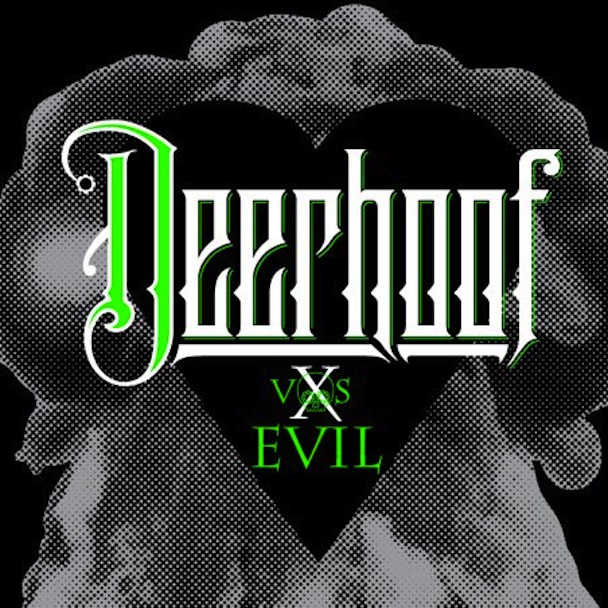Deerhoof, the ultra-quirky indie math rock/pop/irony heavy band is back with an album cheekily titled “Deerhoof Vs. Evil”.
To me Deerhoof is a band that I am constantly curious about. They seem to be combining things that one wouldn’t necessarily think go together. To me they are a study in opposites. Their singer – a tiny Japanese woman with a super-cute (almost too cute) high pitched vocal style – is backed by an at times very heavy hitting team of guitars and drums that explore disjunct math rock meter shifts. The lyrics are often quite simple and repeated over and over again, take for example their infamous song “Panda Panda Panda” where the lyrics are mostly just the song’s title. “Deerhoof Vs. Evil” has Deerhoof sticking to these principles and adding some depth to their music.
The usual noisy and angular guitars are playing a noticeably smaller role, traded instead for acoustics, there is a reliance on quieter aspects of songwriting notably in “No One Asked to Dance” and “I Did Crimes for You”. “No One Asked to Dance” displays a Spanish influenced guitar style that we haven’t heard from Deerhoof before, and is followed, funnily enough, by a song called “Let’s Dance the Jet” which sounds more like something that might be heard on their “Milk Man” album, which to me, is an album that showcases their typical sound. Usually math rock isn’t this sweet and at times this album can be really beautiful. Some songs open up into some really gorgeous, dreamy melodies. There are still a lot of places that pack quite a powerful punch.
Take for example the track “Behold A Marvel in the Darkness” where the lyric that is repeated is “What is this thing called love?”. That line is underpinned by a gentle guitar line, a few bass guitar plucks and sparse drums. It is soon followed by an explosion into a joyous and celebratory sound with a full wall of guitars, drums and cymbals shattering the silence like an atomic bomb. This band can go back and forth from contemplative and sparse to exuberant and loud instantly. They can turn on a dime. The fact that the music is commenting on the lyric is also something that shows a growth in their songwriting.
Sticking with the theme of opposites there is the fact that Deerhoof is adept at creating pop songs that are extremely dense and quite complicated but still fit inside a pop song idiom. The layered, polyrhythmic arrangements that are part of their sound point to drummer/founder Greg Saunier as a major part of the writing process. The complexity is pulled off in such a way that it never seems to belt one over the head. I hardly even noticed the first few times that I listened to the album until I really started to try to pull apart the songs as I listened. That is saying something, considering that it is one of the first things that I will usually listen for when I hear an album, especially coming from a band like this where I have come to expect it.

Pop sensibilities are on display in the standout track “Super Duper Rescue Heads!”. First though, that title. The title of the song alone can give someone who has never heard the band before a pretty good idea of what they are all about. It’s that outward quirkiness that helps to make Deerhoof so accessible. Despite the sense of humor, the music is written and played with a confidence and seriousness, though it’s never too much. They don’t take themselves all that seriously, but there is nothing goofy about them. It’s a fine balance and they manage to keep it always in check.
“Secret Mobilization” starts off sounding like a Stereolab track before drifting into artier territory with the guitar wandering across neighboring harmonies while the drums and bass remain rock steady. The lyrics are repetitive, as usual for this album, which makes me think of another interesting contradictory juxtaposition within the music: it is like complex minimalism with shifting layers that repeat cyclically. The ending of this song explodes as the lead guitar shreds and squeals out a brief lick. The song “Hey I Can” opens percussion heavy with mallet instruments densely layered before schizophrenically jumping into somewhat more clear territory for the verse, and again to the chorus with a drastic shift in tempo that is pulled off so smoothly that it almost passes undetected.
Even the title of the album, “Deerhoof Vs. Evil” is a contradiction. Deerhoof is not the first thing that springs to mind when one thinks about fighting anything, especially something as looming and dangerous as, well, evil itself. They may write songs about superheroes and fighting crime but they are usually remembered for songs about, as mentioned before, pandas or seeing a dog on the sidewalk. Whatever it is that they are doing, all of the elements seem to work well together. Each time that I listen to this album I am only disappointed by the fact that it is over so quickly. The music is so well constructed that the apparent incongruities and maze of contradictions don’t hinder but instead become a part of Deerhoof’s charm and style. It’s why nobody can help but love Deerhoof.
[audio:http://quartertonality.com/wp-content/uploads/2011/02/06-Deerhoof-Super-Duper-Rescue-Heads.mp3|titles=Super Duper Rescue Heads!]
